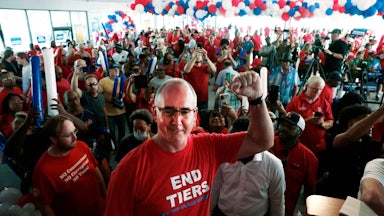I can’t account for the mainstream press’s peculiar impulse to downplay the United Auto Workers’ important victory Friday at a Volkswagen plant in Chattanooga, Tennessee. Granted, The New York Times called it a “milestone,” The Washington Post called it “historic,” and The Wall Street Journal called it a “breakthrough.” But all three papers kept this news off Page One, where historic milestones and breakthroughs logically belong, and instead buried the news deep inside. The Times followed up with a story by labor reporter Noam Scheiber explaining why this probably won’t lead to more successful union drives in the South, except (yawn) maybe next month at a Mercedes-Benz plant near Tuscaloosa.
Those who lost this battle aren’t treating the matter as a ho-hum affair. “We want to keep good paying jobs and continue to grow the American auto manufacturing sector here,” the Republican governors of Tennessee, Georgia, Mississippi, South Carolina, Alabama, and Texas said in a joint written statement issued shortly before the Chattanooga workers started voting. “A successful unionization drive will stop this growth in its tracks.”
The claim is of course absurd. The South already has a few unionized auto plants; there’s a General Motors plant in Arlington, Texas, for example, that’s represented by UAW Local 276, and a Ford plant in Louisville that’s represented by UAW Local 862. Even so, the six governors made clear they were terrified at the prospect of losing the third plant-wide vote in Chattanooga, after winning the first two in 2014 and 2019. And lose they did. It was the first time in history that a foreign-owned auto plant was unionized in the South, after years of Southern states throwing money at foreign automakers to invest in the United States.
You probably think union votes entail conflict between labor and management. That is, in fact, how it usually goes. But foreign auto manufacturers, especially German ones, operate under certain constraints when the UAW comes calling. Powerful labor unions and works councils back home (especially in Germany) are apt to disapprove of union-busting, and (less exaltedly) German workers don’t relish competing with cheaper foreign (in this case, United States) labor. Consequently, even when foreign manufacturers oppose union drives, they don’t union-bust with the same gusto as Americans. Republican politicians, therefore, step in.
These Republicans oppose giving the UAW more of a toehold in the South partly because labor unions tend to breed Democratic voters. But more urgently, Steve Silvia, an American University economist, told me, they oppose it because they’ve spent so much “taxpayer money to bring in these foreign plants that they feel a bit of ownership.” You could almost call them socialists, except socialists don’t usually bust unions. The Koch-funded American Legislative Exchange Council, or ALEC, which writes pro-business laws for state legislatures, has lately been peddling a “Taxpayer Dollars Protect Workers Act” that bars state subsidies to any business that recognizes a union voluntarily based on the collection of union authorization cards. Another way of saying that is that the state in question will pay private companies not to recognize unions voluntarily.
I find this hard to square with the conservative notion that government should be limited and not interfere with the workings of the free market. Conservatives are supposed to believe that a private corporation is better situated than some politician to decide what to do about a union drive. That’s what the Wall Street Journal said, anyway, in its editorial about the Chattanooga victory. In doling out funds from the 2022 Inflation Reduction Act, the Journal complained, “Democrats have used funding to, er, persuade auto makers to welcome unions.” But where was the Journal editorial page’s dudgeon last year when Tennessee became the first state to enact the ALEC law? Wasn’t that Republicans using funding to, er, persuade automakers to spurn unions? Georgia will become the second state to enact the ALEC law after Governor Brian Kemp signs it, and Alabama will likely be next. These will provide ideal news pegs for the Journal to correct this oversight and demonstrate consistency.
In Chattanooga Round One, back in 2014, Volkswagen management stayed neutral, to the profound annoyance of Tennessee’s Republican politicians and Grover Norquist, whose Center for Worker Freedom, a spinoff of his anti-tax group Americans for Tax Reform, campaigned against the union drive. Bob Corker, then the Republican senator from Tennessee (and previously mayor of Chattanooga), stated publicly two days before the vote that he was “very certain that if the UAW is voted down” Volkswagen would step up investment “in the next couple of weeks.” That prompted VW’s chief of operations in Chattanooga to effectively call Corker a liar by stating publicly that the union vote would have no bearing on new investment. It was a very weird situation. Anyway, the union vote lost. VW subsequently opposed unionizing the Chattanooga plant, emphatically in the 2019 vote and less so in 2024, when the UAW won a 73 percent majority.
Management at Mercedes-Benz in Alabama is taking a harder line against the union drive there, including holding captive meetings in which the company’s United States chief said workers “shouldn’t have to pay union dues that generate millions of dollars per year for an organization where you have no transparency where that money is used.” As the UAW pointed out, this pretty explicitly violated Mercedes-Benz’s own Principles of Social Responsibility and Human Rights, which state: “In the event of organization campaigns, the company and its executives shall remain neutral.”
Also taking a harder line in Alabama—a harder line even than Mercedes management—is Republican Governor Kay Ivey. “Do you want continued opportunity and success the Alabama way?” Ivey said in a written statement as the Mercedes organizing drive picked up steam. “Or do you want out-of-state special interests telling Alabama how to do business?” Never mind that ALEC, whose anti-union bill Ivey will surely sign if it reaches her desk, resides 800 miles away in Virginia. The Alabama way is no different from the Tennessee way or the Georgia way or any other Southern way: It’s to pay non-union autoworkers less than union autoworkers.
It isn’t very flattering to tell a Mercedes worker that the only thing he’s got going is that he’ll work for less money. Mercedes workers are starting to notice that. Jeremy Kimbrell, a measurement machine operator and member of the Mercedes organizing committee, has publicly called the Alabama way the “Alabama discount,” and pledged to end it. The Mercedes union vote will take place May 13–17.
The UAW doesn’t call union elections until it knows, through the collection of union authorization cards, that 70 percent are ready to join. So even at Mercedes, which is fighting the union drive more vigorously than Volkswagen did, odds seem better than even that the UAW will rack up another victory. “I believe a big majority there will vote in favor,” UAW President Shawn Fain told Steven Greenhouse in The Guardian. A Hyundai plant in Montgomery, Alabama could be next.
These union drives, which vindicate my extremely high opinion of Fain, put the Republican party in an awkward spot. The GOP is, of course, single-mindedly committed to killing off organized labor. But at the same time, it’s positioning itself as the party of the working class. How can you be for the working class when you not only oppose government policies that favor unions, but also pressure private-sector companies not to recognize unions?
Democrats, of course, do the opposite, pushing private-sector companies to embrace unions, starting with President Joe Biden, who said after the Chattanooga vote, “I am proud to stand with auto workers now as they successfully organize at Volkswagen.” The Journal is right when it says Democratic politicians pressure companies that want IRA funds to embrace unions. I wish they pushed even harder. When Democrats behave this way they show consistency in their support for the working class. When Republicans work to kill off organizing drives they show a pretty glaring inconsistency. It makes them look like phonies. We are, I realize, living in a sort of golden age for phonies, where phonies can count on a shockingly large measure of support from the working class. But surely there are limits.










